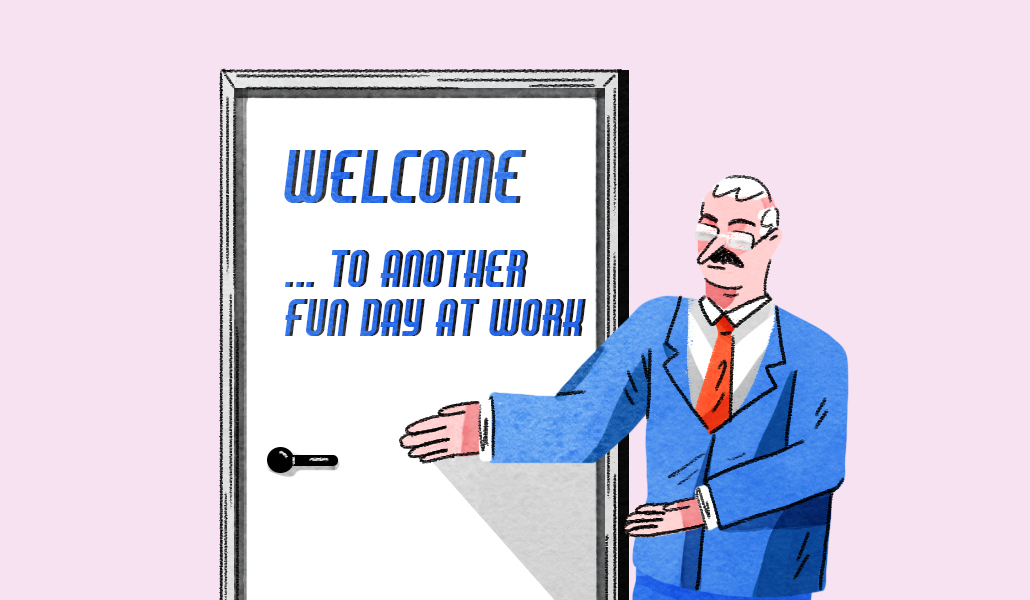Tik Tok Trend Watch: Why are skits about corporate work life going viral?

If you’ve been on the work side of TikTok, you’ve probably come across different accounts that are poking fun at the corporate world through different skits that are all too familiar for those working 9 to 5s.
On the app, #WorkLife has 30.6 billion views, from content that ranges from day-in-the-life depictions to videos about work dramas and hilarious coworkers. #WorkTok has an additional 2.4 billion views, and #CorporateTikTok has 4.9 billion views. Between each of those hashtags, creators are rising to the surface and taking advantage of the reliability of the content that can be made in this sector.
“It’s the relatability of it all and the fact there are so many small universal insights that we might not talk about, but then suddenly people post about it on TikTok and you’re like ‘oh, I feel the same way,’” said Malene Hold, head of TikTok for social media marketing agency Kubbco.
Corporate Erin, a character played by Lisa Beasley who has nearly 300,000 followers on the app, has taken the persona of head of HR to create skits that get people fired up almost as much as their own HR managers do. In one of her most viral videos, she describes herself as “the manager for the manager of logistics from management of mcManagement” who is “here making sure all the deliverables get across.”
But it’s not just what she’s saying – it’s how she says it. Her corporate accent is spot on. One comment on her video sums it up perfectly: “The corporate accent, the nonsense, the talking for 30 minutes and saying nothing.”
Her videos go on like that, and she even collaborates with other creators in the same space, like Corporate Brian, who has over 100,000 followers. He describes the character he plays as “aloof, never gets it right, missing the mark” – not too far from how he actually was in the workplace.
In his most viral video, he films a Zoom call with colleagues where he said “I read the memo, it said WFH optional, between Thanksgiving and Christmas, so work-free holiday, I was just going to –” before being interrupted by his “colleague” who says “No Brian, WFH optional is work from home optional … not work free holiday.”
The style is so realistic that if you were just scrolling through TikTok you might think it’s a real video. However, it’s just a skit that parodies the corporate world, with a nod to how stressful it is to understand corporate language and culture.
“In my skits, I’ve had a bit of a jaded perspective to the corporate world,” said Brian Kearney, who is behind the TikTok persona Corporate Brian. “Once I got laid off from my 9 to 5, I was a bit more liberal with what I was posting. I think that really struck a chord with people.”
So why does it work? Kearney says it’s because of the mix of relatability and pure entertainment. “Other people feel the same way but maybe are just too afraid to say it,” said Kearney. “But the other side of the content, people have equated it to watching The Office if it was done now in the present day. It’s a sketch comedy and more entertaining.”
In fact, The Office’s TikTok account even got involved in the comments, writing: “Michael definitely would be team Work Free Holiday.” And other brands chimed in too. Jobs site Indeed’s account wrote: “Motion to officially change WFH meaning all in favor say aye.” And the most-liked comment was: “Is Corporate Erin on the case?”
Another big creator in the game is Corporate Natalie who has over half a million followers on TikTok. In one of her most recent videos, she picks apart Gen Zers in a skit about giving that generation feedback. She says in the video: “I noticed starting on Jan. 1 and then going, it looks like indefinitely, you put two-hour blocks every day from 11 to 1 for ‘protecting your peace.’ Can you just share a little bit more with me about how these pertain to our work as a consulting firm?”
So how does she choose what to make videos on?
“Almost all of my skits are based on personal experiences or conversations with friends and followers,” said Natalie Marshall. “Like many creators, I have a running notes page on my phone that documents experiences that I think are video-worthy.”
But the key goes back to the relatability aspect that Kearney highlighted as well: “I try to ensure that every video I post is relatable in some way, so the viewer thinks ‘I definitely know someone who’s like this’ or ‘that’s me.’ Her account first gained attention during the pandemic when she was highlighting the shared experience of working from home.
“I aimed to create a sense of community on my channels by poking fun at the uncomfortable work-from-home transition and niche experiences that came with it,” said Marshall. “The content I continue to make gives people the opportunity to find pockets of humor in an oftentimes stressful corporate environment.”
And she’s not necessarily surprised by how much it resonates with people when work is a huge part of most people’s daily lives.
“It’s exciting to see different corporate perspectives and experiences on social media platforms,” said Marshall.
Do leaders in the corporate world know about the light-hearted fun happening on TikTok and could it impact the corporate world in any way? Kearney says he doubts it, but in the meantime, he’s all for the entertainment happening now.
“I haven’t thought about whether these videos could change company culture,” said Kearney. “But I do think maybe years down the line when older generations are fading out and with Gen Z in the picture, the workplace could potentially change away from what we’re making skits on now.”


